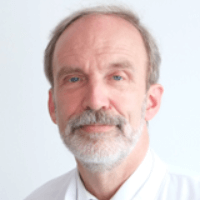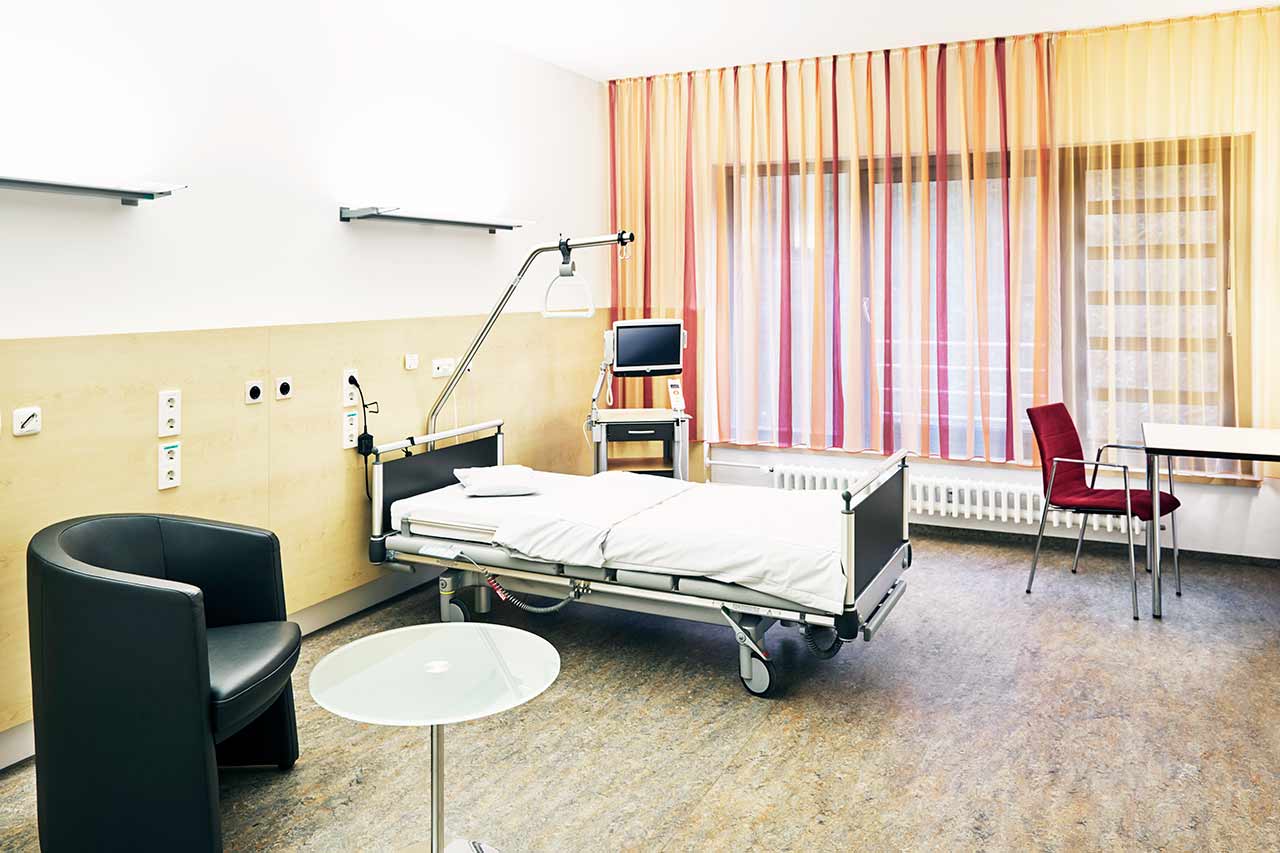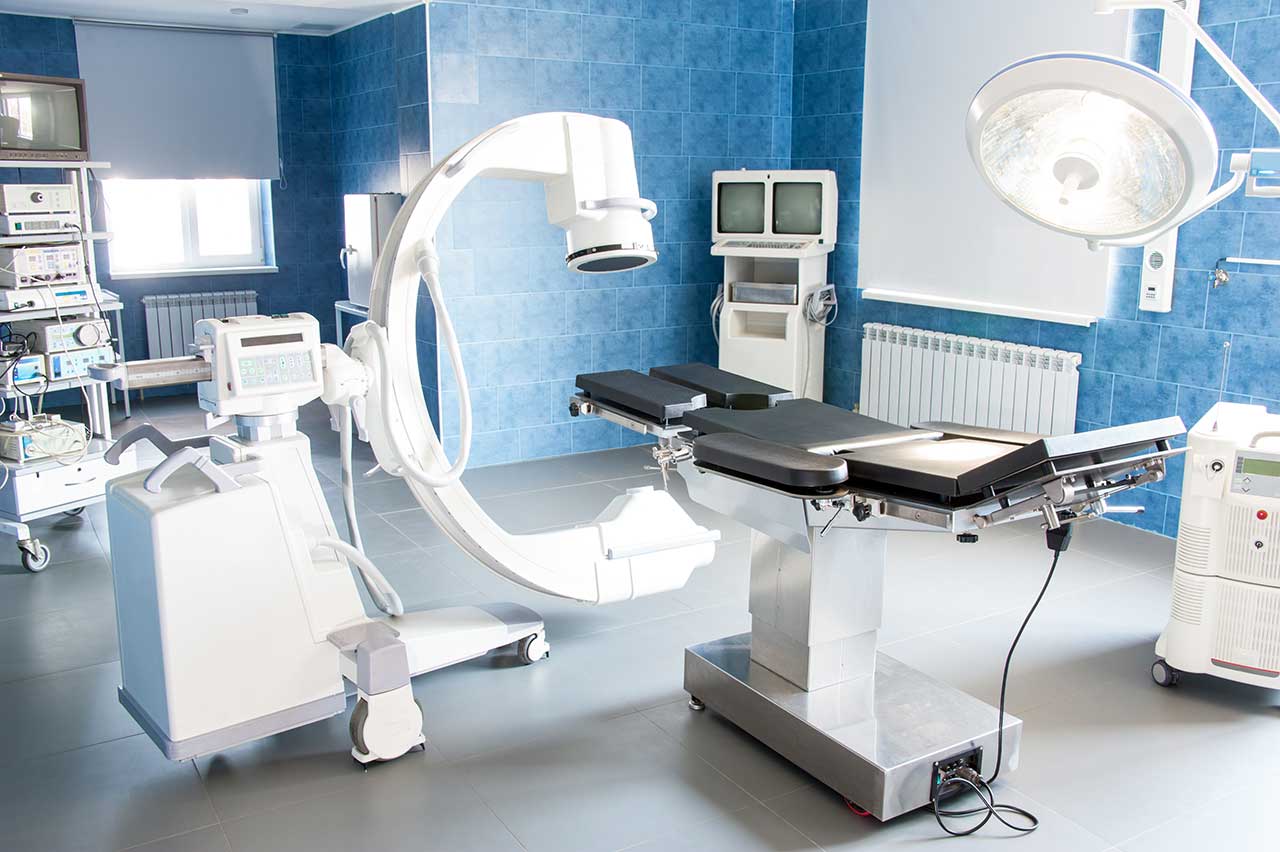
The program includes:
- Initial presentation in the clinic
- clinical history taking
- review of medical records
- physical examination
- laboratory tests:
- thyroid function test (TSH-basal, fT3, fT4)
- mineral metabolism analysis (Na, K, Ca, Mg)
- lipid metabolism (HDL/LDL, cholesterol, triglycerides,
Lip(a), homocysteine) - iron content (ferritin, iron)
- blood coagulation analysis (aPTT, PT, INR)
- metabolic status (uric acid, total glucose, HbA1c)
- inflammatory parameters (CRP, ESR)
- cardiovascular disease risk markers
- sonography of adrenal gland
- measurement of arterial blood pressure (24h)
- vascular system assessment
- resting and exercise ECG
- color doppler echocardiography
- color doppler sonography of cerebral vessels
- fundus examination
- nursing services
- full hospital accommodation
- explanation of individual treatment plan
- written statement
Required documents
- Medical records
- ECG (if available)
Service
You may also book:
 BookingHealth Price from:
BookingHealth Price from:
About the department
The Department of Gastroenterology, Hepatology, Cardiology, Nephrology and Pulmonology at the Marien Hospital Duesseldorf offers all the options of modern diagnostics and treatment in the areas of its specialization. The team of doctors of the medical facility admits patients with various pathologies of the gastrointestinal tract and liver, pathologies of the cardiovascular system, kidneys, lungs and respiratory tract. The department provides both inpatient and outpatient medical care. The department has 96 beds, 10 of which are for patients who need intensive care. The medical facility has modern diagnostic rooms, as well as well-equipped rooms for endoscopic interventions. Special attention should be given to the high professionalism of doctors and nursing staff: each patient receives the most effective treatment that meets his needs and wishes. The Head Physician of the department is Prof. Dr. med. Reinhard Lüthen.
An integral part of the department's clinical practice is the prevention, diagnostics and treatment of gastroenterological diseases. Patients with pathologies of the stomach, esophagus, pancreas, small and large intestines receive medical care here. The department also provides therapy for liver, gallbladder and bile duct diseases. Of particular interest to the department's doctors is the treatment of inflammatory and malignant gastrointestinal diseases. In many cases, the specialists manage to cure the pathology with the help of modern drugs, but they often have to resort to endoscopic procedures. Endoscopic tests are used to examine the digestive system from the inside, which allows the doctors to make the most accurate diagnosis. Endoscopy is also widely used for therapeutic purposes, namely for the treatment of internal bleeding, stenosis, early-stage tumors, etc. The department's specialists have long successful experience in the field of endoscopic procedures, so patients can count on high efficiency and safety.
The department's competence also includes invasive and non-invasive diagnostics, conservative and invasive treatment of cardiovascular diseases. The department has excellent diagnostic options for examining the cardiovascular system, including resting and stress ECG, 24-hour ECG recording, 24-hour blood pressure monitoring, stress echocardiography, and cardiac catheterization. Once the comprehensive diagnostics is completed, the attending physician determines further treatment tactics: drug therapy and/or interventional cardiac catheterization. In the field of catheter-based therapy for heart pathologies, the most common procedures include the implantation of single- and dual-chamber pacemakers for arrhythmia treatment.
The focus of nephrologists is on patients suffering from kidney diseases. During the diagnostics for suspected nephrological disease, doctors use various laboratory tests, special ultrasound scans, kidney punctures, and other diagnostic procedures. The first-line treatment is usually drug therapy with the most advanced medications. If such an approach does not give satisfactory results and there is a further deterioration in the patient's health condition, the department's specialists resort to renal replacement therapy (dialysis). Dialysis is carried out in a special center designed to receive 8 patients at a time. More than 3,500 dialysis procedures are performed here annually, which is a confirmation of the high competence of the specialists in this medical field. In addition, the medical facility has special equipment for renal replacement therapy for patients with chronic hepatitis B and C. The department offers three types of dialysis: hemodialysis, hemofiltration and hemodiafiltration.
The department's therapeutic offer is complemented by the diagnostics and treatment of pulmonary diseases. The most common diagnoses in the work of the department's medical staff are obstructive pulmonary disease (chronic bronchitis and bronchial asthma), pulmonary emphysema, lung cancer, infectious diseases of the lungs and pleura. Whenever possible, doctors use only drug therapy, but if necessary, they also successfully perform various endoscopic procedures. Therapeutic bronchoscopy, bronchoalveolar lavage, drainage, pleurodesis, and other interventional procedures are often performed here.
The department's main clinical activities include:
- Diagnostics and treatment of gastrointestinal diseases: diseases of the stomach, esophagus, small and large intestines, pancreas
- Diagnostics and treatment of diseases of the liver, gallbladder and bile ducts: hepatitis, cirrhosis, biliary obstruction, gallbladder inflammation
- Diagnostics and treatment of cardiovascular diseases: coronary heart disease, cardiomyopathies, arrhythmias, hypertension
- Diagnostics and treatment of kidney diseases: kidney stone disease, pyelonephritis, glomerulonephritis
- Diagnostics and treatment of diseases of the lungs and respiratory tract: chronic bronchitis, bronchial asthma, pulmonary emphysema, infectious lung diseases, lung cancer
- Diagnostics and treatment of other diseases
The department's range of therapeutic services includes the following options:
- Drug therapy
- Intensive care
- Renal replacement therapy
- Hemodialysis
- Hemofiltration
- Hemodiafiltration
- Endoscopic procedures
- Gastroscopy and colonoscopy to eliminate stenosis, stop internal bleeding
- Enteroscopy
- Endoscopic examination of the bile ducts with the follow-up stone removal
- Puncture and drainage under endoscopic ultrasound guidance
- Bile duct drainage for benign and malignant neoplasms
- Placement of feeding tubes (PEG/PEJ)
- Bronchoscopy and videobronchoscopy
- Bronchoalveolar lavage
- Placement of a chest tube
- Pleurodesis
- Other treatment methods
Curriculum vitae
University Education
- 1977 Started studying Human Medicine at the University of Duesseldorf.
- 1980 Continued education at the Julius Maximilian University of Würzburg.
- 1984 Medical examination (grade: very good/good).
- 1984 Admission to medical practice, Julius Maximilian University of Würzburg.
- 1984 Doctoral thesis defense, magna cum laude, Julius Maximilian University of Würzburg.
Medical and Scientific Activities
- 1984 - 1985 Medical Captain, Bundeswehr (Armed Forces of the FRG).
- 1985 - 1987 Assistant Physician, Department of Internal Medicine, Hospital Bethesda Moenchengladbach at the RWTH Aachen.
- 1987 - 1991 Assistant Physician, Department of Gastroenterology, Hospital at the Heinrich Heine University Duesseldorf.
- 1991 - 1993 Fellow of the German Research Society (DFG), postdoctoral studies in the Department of Gastroenterology, University of California, Veterans Administration Medical Center, San Francisco, USA.
- 1993 - 1995 Assistant Physician, Department of Gastroenterology, Hepatology and Infectology, University Hospital Duesseldorf.
- 1995 Board certification in Internal Medicine.
- 1995 Senior Physician.
- 1996 Specialization in Gastroenterology.
- 1999 Habilitation. Work on the pathophysiology of acute pancreatitis and a lecture on transjugular intrahepatic portosystemic shunting.
- 2002 Head Physician of the Department of Gastroenterology, Hepatology, Cardiology, Nephrology and Pulmonology at the Marien Hospital Duesseldorf.
Memberships in Medical and Scientific Organizations
- German Society for Gastroenterology, Digestive and Metabolic Diseases.
- American Pancreatic Association.
- German Pancreas Club.
- American Gastroenterological Association.
- Working Group on Endosonography of North Rhine-Westphalia (Founding Member).
- Working Group on Gastrointestinal Cancer of the German Cancer Society.
- Scientific Advisory Board Leberliga.
Photo of the doctor: (c) Marien Hospital Düsseldorf
About hospital
The Marien Hospital Duesseldorf is a modern medical facility in the very center of Duesseldorf and a recognized Research Center. The foundation stone of the hospital was laid back in 1864 with the support of the Catholic Church. The Christian principles of helping and supporting patients have not changed at all over the years, but the level of medical care has become fundamentally different: a small hospital has been transformed into a multidisciplinary medical center with 11 internal departments, institutes and 7 interdisciplinary centers. Thus, patients can receive a comprehensive diagnostic examination and treatment under one roof. The medical facility is an academic hospital, so patients have access to innovative achievements in the field of modern medicine and receive the most effective treatment.
The hospital has 437 beds for inpatient treatment. It provides first-class medical services to 63,000 patients every year. The doctors and nursing staff of the hospital strive to provide each patient with customized treatment, taking into account their wishes and needs. In addition to providing top-class medical care, the specialists pay attention to the humane attitude towards patients and their life situation. Doctors devote enough time to personal communication with patients and support them in every possible way on their path to recovery.
The team of the hospital consists of competent doctors who are the best professionals in their medical field. They all work in interdisciplinary cooperation. In their clinical practice, doctors use state-of-the-art equipment, the very latest technologies, as well as innovative treatment methods, which in combination allows achieving optimal treatment outcomes.
Photo: (с) depositphotos
Accommodation in hospital
Patients rooms
The patients of the Marien Hospital Duesseldorf live in comfortable patient rooms equipped with everything necessary. The room furnishing includes a comfortable bed with an orthopedic mattress, a bedside table, a wardrobe, a table, chairs, and a TV. The rooms are designed in light colors so that patients feel comfortable here. Each patient room also has an ensuite bathroom with shower and toilet.
Meals and Menus
The patients of the hospital are offered a healthy and balanced three meals a day: buffet breakfast, lunch and dinner. The menu also includes dietary and vegetarian dishes.
If for some reason you do not eat all the foods, you will be offered an individual menu. Please inform the medical staff about your food preferences prior to treatment.
Further details
Standard rooms include:
Religion
Religious services are available upon request.
Accompanying person
Your accompanying person may stay with you in your patient room or at the hotel of your choice during the inpatient program.
Hotel
You may stay at the hotel of your choice during the outpatient program. Our managers will support you for selecting the best option.





